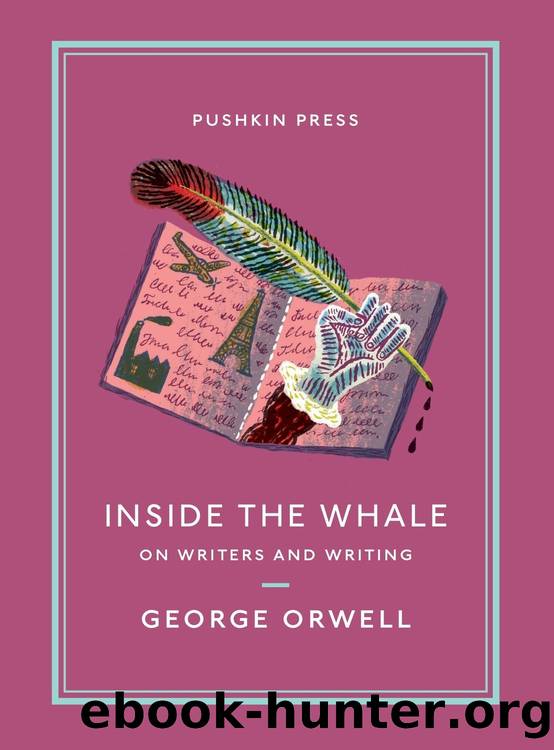Inside the Whale by George Orwell

Author:George Orwell
Language: eng
Format: epub
Publisher: Pushkin Press
Published: 2021-06-15T00:00:00+00:00
And again, having described the rough boys among whom he worked:
No words can express the secret agony of my soul as I sunk into this companionship⦠and felt my hopes of growing up to be a learned and distinguished man crushed in my bosom.
Obviously it is not David Copperfield who is speaking, it is Dickens himself. He uses almost the same words in the autobiography that he began and abandoned a few months earlier. Of course Dickens is right in saying that a gifted child ought not to work ten hours a day pasting labels on bottles, but what he does not say is that no child ought to be condemned to such a fate, and there is no reason for inferring that he thinks it. David escapes from the warehouse, but Mick Walker and Mealy Potatoes and the others are still there, and there is no sign that this troubles Dickens particularly. As usual, he displays no consciousness that the structure of society can be changed. He despises politics, does not believe that any good can come out of Parliament â he had been a parliamentary shorthand writer, which was no doubt a disillusioning experience â and he is slightly hostile to the most hopeful movement of his day, trade unionism. In Hard Times trade unionism is represented as something not much better than a racket, something that happens because employers are not sufficiently paternal. Stephen Blackpoolâs refusal to join the union is rather a virtue in Dickensâs eyes. Also, as Mr Jackson has pointed out, the apprenticesâ association in Barnaby Rudge, to which Sim Tappertit belongs, is probably a hit at the illegal or barely legal unions of Dickensâs own day, with their secret assemblies, passwords and so forth. Obviously he wants the workers to be decently treated, but there is no sign that he wants them to take their destiny into their own hands, least of all by open violence.
As it happens, Dickens deals with revolution in the narrower sense in two novels, Barnaby Rudge and A Tale of Two Cities. In Barnaby Rudge it is a case of rioting rather than revolution. The Gordon Riots of 1780, though they had religious bigotry as a pretext, seem to have been little more than a pointless outburst of looting. Dickensâs attitude to this kind of thing is sufficiently indicated by the fact that his first idea was to make the ringleaders of the riots three lunatics escaped from an asylum. He was dissuaded from this, but the principal figure of the book is in fact a village idiot. In the chapters dealing with the riots Dickens shows a most profound horror of mob violence. He delights in describing scenes in which the âdregsâ of the population behave with atrocious bestiality. These chapters are of great psychological interest, because they show how deeply he had brooded on this subject. The things he describes can only have come out of his imagination, for no riots on anything like the same scale had happened in his lifetime.
Download
This site does not store any files on its server. We only index and link to content provided by other sites. Please contact the content providers to delete copyright contents if any and email us, we'll remove relevant links or contents immediately.
Machine Learning at Scale with H2O by Gregory Keys | David Whiting(4313)
Never by Ken Follett(3957)
Fairy Tale by Stephen King(3399)
Will by Will Smith(2920)
Fantastic Beasts and Where to Find Them: The Original Screenplay by J. K. Rowling(2518)
It Starts With Us (It Ends with Us #2) by Colleen Hoover(2367)
Can't Hurt Me: Master Your Mind and Defy the Odds - Clean Edition by David Goggins(2341)
The Storyteller by Dave Grohl(2236)
Friends, Lovers, and the Big Terrible Thing by Matthew Perry(2230)
The Becoming by Nora Roberts(2203)
Cloud Cuckoo Land by Anthony Doerr(2113)
New Morning Mercies: A Daily Gospel Devotional by Paul David Tripp(1919)
A Short History of War by Jeremy Black(1848)
HBR's 10 Must Reads 2022 by Harvard Business Review(1844)
The Complete Witcher by Andrzej Sapkowski(1840)
Cytonic by Brandon Sanderson(1835)
Go Tell the Bees That I Am Gone by Diana Gabaldon(1758)
Leviathan Falls (The Expanse Book 9) by James S. A. Corey(1745)
A Game of Thrones (The Illustrated Edition) by George R. R. Martin(1745)
